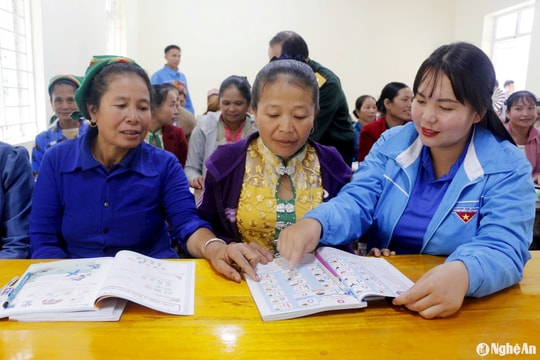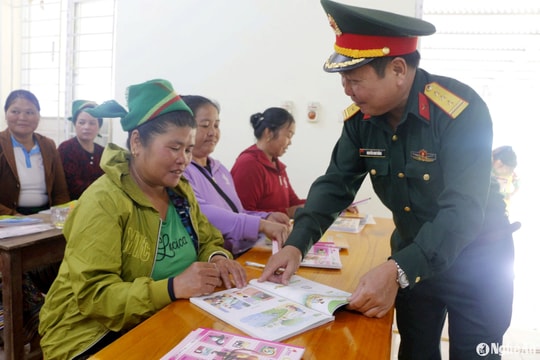Teachers do not want their profession to have unusual favors.
On the morning of November 20, under the direction of Vice President of the National Assembly Nguyen Thi Thanh, the National Assembly discussed in the hall the draft Law on Teachers.
Teachers' salaries are ranked highest in the administrative career sector.
Speaking at the opening of the discussion session, Vice Chairwoman of the National Assembly Nguyen Thi Thanh stated that the discussion session on the Law on Teachers was scheduled on November 20, demonstrating the respect of the National Assembly and the National Assembly Standing Committee for generations of teachers and the education sector, who have made, are making, and will make great contributions to the glorious and noble cause of educating people.
Delegate Do Huy Khanh (Dong Nai delegation) said that the Law on Teachers was built and promulgated very necessary and in line with the reality as well as the policies of the Party and State in the current period, to decentralize management as well as remove difficulties for the education and training sector. "More than 1.6 million teachers and education managers are looking to the National Assembly, hoping that the draft Law on Teachers submitted to the National Assembly for comments this time will be passed in the nearest session so that teachers can be truly happy with their profession, enjoy their profession and make a living from their profession," said Delegate Do Huy Khanh.
One of the issues that received attention and discussion from National Assembly delegates was the policy and regime for teachers, aiming to attract talent to the education sector, including the issue of salary.
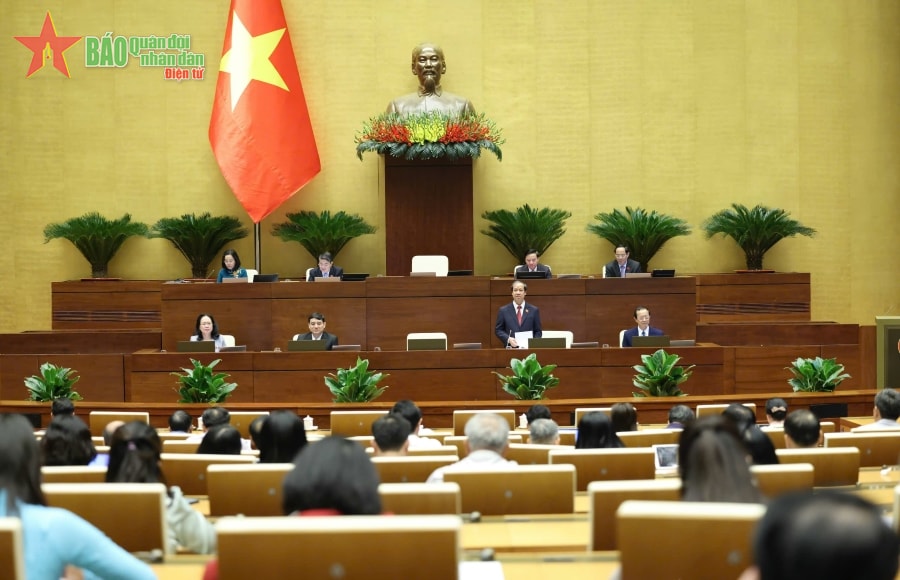 |
| Minister of Education and Training Nguyen Kim Son speaks at the conference hall. Photo: TRONG HAI |
According to the Government's proposal in the draft Law on Teachers, the salary policy for teachers is prioritized. In particular, the basic salary according to the teacher salary table is ranked highest in the administrative career salary scale system; teachers are entitled to preferential allowances and other allowances depending on the nature of the job, according to the region as prescribed by law. Teachers continue to receive seniority allowances until the salary policy according to Resolution No. 27-NQ/TW is implemented. Preschool teachers; teachers working in especially difficult areas, ethnic minority areas, mountainous areas, coastal areas and islands; teachers of specialized schools; teachers implementing inclusive education; teachers who are ethnic minorities and teachers in some specific professions are given priority in the salary and allowance regime compared to other teachers. Teachers recruited and assigned salaries for the first time are assigned a salary increase of 1 level in the administrative career salary scale system.
Discussing this content, the majority of National Assembly delegates expressed high agreement with the priority of salary policy for teachers as proposed by the Government. However, some delegates suggested that the highest salary for teachers in the administrative career salary scale system must also go hand in hand with the quality of teachers. "The quality of the teaching staff is of great importance, playing a decisive role in improving the quality of education, developing high-quality human resources, developing people, meeting the requirements of industrialization, modernization and international integration. Therefore, along with implementing specific salary policies, in the process of enforcing the law, there should be regulations to improve the quality of the teaching staff, gradually building a team of teachers who are truly good at their profession, fully meeting the regulations on teacher ethics, dedication and responsibility to the profession", said delegate Duong Khac Mai (Dak Nong delegation).
Delegate Thach Phuoc Binh (Tra Vinh delegation) said that the regulation that teachers' salaries are ranked highest in the administrative career salary scale system is unclear, which can easily lead to different understandings and applications. The delegate suggested building a separate salary scale for teachers, ensuring that salaries are clearly higher than those of other sectors in the administrative career sector.
Similarly, delegate Hoang Van Cuong (Hanoi delegation) expressed the view that the teaching staff accounts for 70% of the civil servants in the entire social force. Therefore, applying the salary scale of the civil servant system to the teaching staff, even when ranked at the highest level, is not appropriate. "It is necessary to build a separate salary scale for the 70% of the civil servants who are teachers, suitable to the characteristics and job position of each teacher, and the salary regime needs to adequately compensate for labor costs, so that teachers can feel secure, enthusiastic, and dedicated to their profession, without having to worry about working extra to make a living," delegate Hoang Van Cuong said.
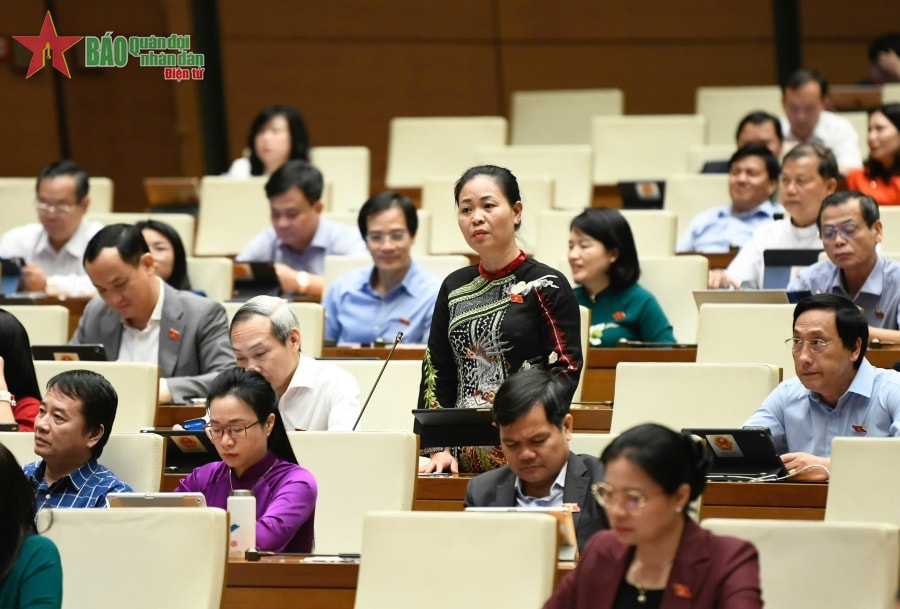 |
| Delegate Nguyen Thi Thu Dung (Thai Binh delegation) spoke at the discussion session. Photo: TRONG HAI |
Teachers do not want their profession to have unusual favors.
Speaking at the meeting, Minister of Education and Training Nguyen Kim Son expressed his opinion that some provisions in this law may be different from those of other laws, such as the provisions on retirement age being different from the Labor Code; the provisions on inter-school teachers and teacher transfers being different from the provisions of the Law on Civil Servants... However, those different provisions serve the goal of developing the teaching staff. Minister Nguyen Kim Son confided: "We also have to look at other sectors and do not want our sector to have any special privileges, benefits or any unusual favors. Teachers are inherently responsible, tolerant, and altruistic people. It is impossible for them to live happily while others around them are poorer than them... Just because there is a very large part of those 1.6 million people who are still not living enough, and if they are not living enough, they cannot wholeheartedly devote themselves to teaching."
According to Minister Nguyen Kim Son, our country has just escaped poverty, it is not yet a rich country, so it is certainly impossible to "give priority to everything". "Therefore, when considering a strategic breakthrough as a top national policy, there must definitely be some priorities. Specifically, on what salary is needed to ensure a minimum living standard for teachers, this side (the draft law - PV) also mentioned a few principles, and we would like to include them in specific regulations for the Government, in accordance with the law-making principles we are mentioning here", said Minister Nguyen Kim Son.
The time is ripe for investing in high-speed rail
On the afternoon of November 20, under the direction of Vice Chairman of the National Assembly Nguyen Duc Hai, the National Assembly discussed in the hall the investment policy for the high-speed railway project on the North-South axis; and adjusted the investment policy for the Long Thanh International Airport Project in Resolution No. 94/2015/QH13 of the National Assembly.
Speaking at the meeting, the majority of National Assembly delegates expressed their agreement with the investment policy for the high-speed railway project on the North-South axis. The delegates said that currently, our country's macro-economy has stabilized, public debt is low, there is absolutely room to continue mobilizing 67 billion USD to serve the high-speed railway project on the North-South axis, in the next 10 years, the scale of our country's GDP will also grow stronger.
In addition, the delegates also analyzed that our country has a long-term shape, the circulation of goods and the need to connect economic centers along the North-South economic corridor is very large. Many areas have development potential but have not been exploited due to high logistics costs. The scale of our country's economy is growing rapidly, so the need to transport goods along the North-South economic corridor in the coming time will be very large. We need to increase the flow of exported goods to Eastern European countries, the Middle East and North Asia to reduce the excessive concentration on some risky markets. Therefore, it is necessary to build high-speed railways to connect with intermodal transport with international and regional transport networks.
Emphasizing that the investment amount for the project is very large, up to 1.7 million billion VND, equivalent to 67 billion USD, National Assembly delegates proposed to focus on mobilizing domestic capital, foreign preferential loans, and limiting the use of ODA capital. Construction costs account for about 50% of the total project investment, equivalent to more than 33 billion USD. Therefore, it is necessary to focus on using domestic materials; organizing the construction of supporting industries for high-speed railways as well as urban railways; preparing human resources and training human resources for high-speed railways as well as urban railways.
Citing lessons learned from urban railway lines in Hanoi and Ho Chi Minh City, National Assembly deputies pointed out that due to the implementation of bidding to select foreign investors for turnkey construction, when construction conditions were not met, foreign investors stopped construction and requested contract penalties, construction time was prolonged, investment capital was greatly increased, and the entire process of operation, repair, and replacement of spare parts also had to depend on foreign suppliers. Therefore, National Assembly deputies proposed to mobilize domestic enterprises with professional capacity to participate in this project.
* In the afternoon of the same day, under the direction of Vice Chairman of the National Assembly Tran Quang Phuong, the National Assembly held a plenary meeting in the hall, listening to the presentation of the Report on the draft Law amending and supplementing a number of articles of the Law on Supervisory Activities of the National Assembly and People's Councils; and the Report on the examination of the draft Law amending and supplementing a number of articles of the Law on Supervisory Activities of the National Assembly and People's Councils.
On November 21, the National Assembly continued working.

.jpg)
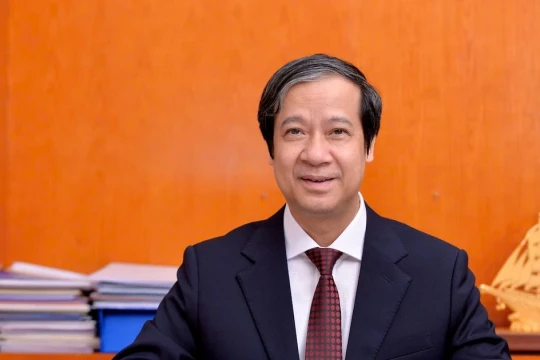
.jpg)
